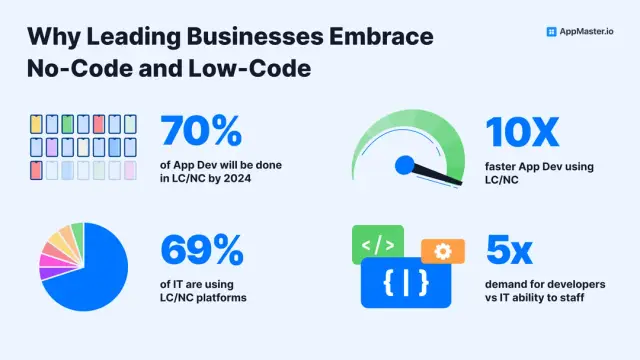The Future of No-Code: Predictions and the Role of REST APIs
Explore how no-code platforms are shaping the future of software development and the increasingly crucial role that REST APIs play in connecting diverse applications.

The Rise of No-Code and Low-Code Platforms
Over the last decade, the software development industry has witnessed a significant trend favoring two remarkable technologies: no-code and low-code platforms. Both solutions aim to streamline application development by minimizing the need for expert coding skills and utilizing visual interfaces instead of complex programming languages.
No-code platforms allow users to create applications without any programming knowledge, basically “dragging and dropping” different components into place. This user-friendly approach can potentially empower non-technical individuals with the tools necessary to create software solutions without direct assistance from seasoned developers. On the other hand, low-code platforms require some degree of coding skills but aim to simplify and accelerate the development process through pre-built components and highly customizable templates.
Both of these technologies have disrupted the software development industry, enabling faster application development, reducing operational costs, and allowing businesses to be more responsive to evolving market needs. As a result, no-code and low-code platforms have gained widespread adoption across multiple industries, with many businesses and individuals reaping the benefits of a more agile and cost-effective approach to software creation.
The rise of these platforms is not an isolated phenomenon; it coincides with significant advancements in related technologies such as APIs (Application Programming Interfaces). In the context of no-code and low-code solutions, APIs facilitate seamless integration between disparate systems, services, and data sources.

How REST APIs Facilitate No-Code Integration
Application Programming Interfaces (APIs) are a crucial component of modern software development, as they allow different applications and services to communicate and exchange information with one another. REST (Representational State Transfer) APIs have gained immense popularity among various types of APIs due to their simplicity, standardization, and ease of use.
REST APIs follow a set of architectural principles that promote statelessness, scalability, and loose coupling between different components. These principles promote highly maintainable and reusable solutions that can be easily integrated into various software systems. The widespread adoption of REST APIs has significantly impacted the no-code and low-code development space, allowing platforms to interact seamlessly with a wide range of existing systems and services with minimal overhead.
A key challenge in software development is the integration of disparate systems and data sources, which often requires specialized knowledge and significant development effort. REST APIs simplify this process, making different services and resources easily accessible and consumable by a broad range of applications. These interfaces provide a standardized and simplified way of structuring data exchange, effectively bridging communication gaps between diverse systems.
No-code platforms leverage REST APIs to enable a level of connectivity that would previously have required considerable coding expertise. By harnessing the power of these APIs, no-code platforms can quickly and easily integrate new services,, without the need for users to possess in-depth programming knowledge. As a result, the barrier to entry for creating comprehensive applications has been significantly reduced, empowering a wider audience to participate in the software development process.
Democratization of Software Development
One of the most significant consequences of the rise of no-code and low-code platforms is the democratization of software development. This shift in the industry has expanded opportunities for businesses and individuals alike, regardless of their technical expertise or levels of resource.
Traditional software development has generally required significant investments in terms of time, labor, and capital. With the advent of no-code and low-code solutions, businesses can now build applications much more quickly and cost-effectively than ever before. The simplicity of these platforms allows non-technical team members to contribute to application development, thereby reducing dependence on specialist developers and fostering a more inclusive working environment.
As software development becomes more democratized, increasing numbers of businesses can harness the power of advanced digital solutions, leveling the playing field between large and smaller enterprises. This democratized environment brings new opportunities for innovation, as creative ideas can be brought to life more rapidly, and new businesses can launch more easily with a reduced need for initial investment.
No-code platforms, in particular, have removed barriers to entry by empowering citizen developers – individuals who develop applications without formal software development or computer science training. As more people access the resources and tools needed for software development, industries will benefit from accelerated innovation and businesses will enjoy increased agility and responsiveness to customer needs.
This democratization trend will continue, as no-code and low-code platforms become more sophisticated and accessible. The potential for these technologies to bring about a more inclusive, responsive, and dynamic software development environment is immense, and their growing adoption is a testament to the exciting possibilities that lie ahead.
Enhancing Business Processes and Scalability
No-code platforms have been credited with significantly enhancing business processes and improving scalability for organizations of various sizes. By leveraging visual interfaces and intuitive development tools, no-code solutions allow businesses to quickly develop, iterate, and deploy new software applications that streamline operations, increase productivity, and meet evolving customer demands.
Scalability is a crucial factor in growing and expanding a business. No-code platforms enable companies to build applications that easily adapt to changing requirements and scale as the business expands. Since no-code solutions are often based on cloud infrastructure, they provide the flexibility necessary to scale resources according to the business' needs.
No-code platforms also foster collaboration among different teams and departments within an organization. By lowering the barrier to entry for software development, non-technical stakeholders like marketers, sales reps, and project managers can participate in the development process and contribute valuable insights. This inclusive environment increases the value of the final product and promotes a better understanding of each team's requirements and capabilities, leading to more efficient business processes.
Predicting the Future of No-Code Development
As the no-code movement continues to gain traction, numerous predictions have emerged about the future of this transformative approach to software development. Some of these predictions include:
Expansion of no-code solutions across industries
No-code platforms will continue to disrupt more sectors, including fintech, e-commerce, healthtech, and beyond. With businesses from all industries recognizing the potential of democratizing software development, the demand for no-code solutions is only expected to grow.
Integration of AI and automation within no-code platforms
The future of no-code development will likely see the integration of artificial intelligence and automation to enhance the capabilities of these platforms. By incorporating AI-driven tools and automations, no-code solutions could become even more powerful, further simplifying the development process and improving the quality of applications.
Rising demand for citizen developers
As businesses increasingly focus on digital transformation, the demand for citizen developers—non-technical workers who possess basic programming knowledge and leverage no-code tools to create applications—will continue to rise. These individuals will be instrumental in accelerating the digital initiatives of organizations that may not have the resources for a dedicated in-house development team.
Greater emphasis on REST APIs
As no-code platforms evolve, REST APIs will be increasingly crucial in facilitating communication and data exchange between disparate applications and services. A greater emphasis on REST APIs could lead to improved interoperability and increased adoption of no-code solutions across the software ecosystem.
Increased security and compliance
With the burgeoning popularity of no-code platforms, there will likely be a heightened focus on securing applications built using these tools. The future may witness no-code platforms offering integrated security features, ensuring applications are developed with security best practices and adherence to industry-specific compliance requirements.
AppMaster's Approach to No-Code and REST APIs
AppMaster is a powerful no-code platform that enables the creation of backend, web, and mobile applications, leveraging the power of REST APIs to make integration simple and efficient. Founded in 2020, AppMaster has continuously evolved to offer a comprehensive and easy-to-use platform for developing scalable applications.
AppMaster's no-code platform offers the ability to visually design data models, create business logic through visual business process designers, and build REST API and WebSocket endpoints. Its seamless integration via REST APIs enables customers to connect their applications with various services and data sources, expanding the possibilities for creating sophisticated, interconnected applications.
With a focus on scalability, AppMaster utilizes the Go programming language for generating backend applications, which can interact with any PostgreSQL-compatible database as a primary data source. This choice of technology ensures that the platform meets the high-load, high-performance requirements of enterprise applications, without incurring technical debt.
Regarded as a high performer by G2 in multiple categories, including No-code Development Platforms, Rapid Application Development (RAD), API Management, Drag & Drop App Builders, API Design, and Application Development Platforms, AppMaster has established itself as a leading no-code solution for businesses of all sizes. With more than 60,000 users as of April 2023, the platform continually expands and improves its offerings, providing customers with a cost-effective and efficient avenue to develop and deploy scalable applications.
The future of no-code development promises rapid innovation and growth, with platforms such as AppMaster leading the way in democratizing software development. From simplifying application creation to enhancing collaboration, no-code platforms transform how businesses design, build, and deploy applications. Coupled with the increased importance of REST APIs in facilitating seamless integration, no-code solutions are poised to become even more powerful and versatile, shaping the future of software development for years to come.
FAQ
Low-code platforms require some coding knowledge to build applications, while no-code platforms allow users to build applications using visual interfaces without needing to write any code.
A REST (Representational State Transfer) API is an application programming interface that follows REST architectural principles, allowing developers to interact with web services in a simple and standardized way.
REST APIs simplify communication and data exchange between different applications, making it easier for no-code platforms to integrate various services and sources without the need for extensive coding knowledge.
Democratizing software development with no-code platforms allows more people to participate in building solutions, reducing dependency on specialized developers and speeding up project development, while also lowering costs.
Some predictions include the expansion of no-code solutions across industries, integration of AI and automation within no-code platforms, and a rising demand for citizen developers.
AppMaster enables the creation of backend, web, and mobile applications using a powerful no-code platform. It also utilizes REST APIs for ease of integration, making it a highly capable, scalable, and cost-effective solution for businesses of all sizes.






